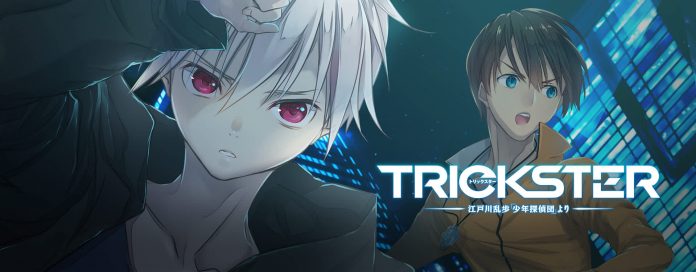I hope for more anime to adopt the same type of setting and formula that Western cop dramas have. It’s a personal favorite of mine (genre-wise), and I look forward to an anime series taking a stab at it. It’s why I’ve gravitated to the likes of Pyscho-Pass and Terror in Resonance. I think the audience for that type of show is under-served and needs a more extensive catalog. When looking at Trickster, I hoped that another cop/detective type show could become a favorite of mine. Sadly, I think the series tried to take on too much.
Trickster is an action/cop drama series that takes place in the future. Detective Kogoro Akechi runs a private organization named the Boy Detectives’ Club. They assist the police in cases that are either impossible to solve or too small for the police to address, and deals with a notorious villain who goes by the alias of Twenty Faces. We follow a member of this group, Kensuke Hanasaki, who has a thing for adrenaline. He enjoys the thrills that the Boy Detectives’ Club provides. During one of his cases, he stumbles upon a young boy by the name of Yoshio Kobayashi who wants to die. The only problem is that Kobayashi has some power that will prevent him from dying. Fascinated by this power, Hanasaki pesters Kobayashi until he joins the Boy Detectives’ Club to figure out more about this strange power and a way to kill him. And as they solve the mystery of Kobayashi’s powers, they also have to stop the terrorist known as Twenty Faces from doing any more harm to the public.
It’s an odd predicament. Usually, I don’t like it when villains linger in cop dramas. There are a few examples where this works, such as Shogo Makishima in Pyscho-Pass. Other cases kept the plot moving in Pyscho-Pass, it was Makishima that became the big focal point when Akane Tsunemori figured out who was causing issues in her jurisdiction. Many will say that the first season of Pyscho-Pass, Makishima was much more compelling than just having a random bad guy each episode. I have a feeling that Trickster tried to do something similar with Twenty Faces, and make him a central character to keep Trickster together. And while I don’t think Twenty Faces was terrible, I don’t think he had the same impact a great villain can provide.
News: "Trickster" Anime Listed For 24 Episodes https://t.co/Z8VMjdBm5p
— Crunchyroll (@Crunchyroll) September 24, 2016
Twenty Faces seemed too fixated on Akechi to hold an interest in the show. Trickster was supposedly more about the members of the Boy Detectives’ Club, but I thought it struggled with that concept. We focused a lot on Akechi and his upbringing more so than the issues the members of the club dealt with internally. We got a glimpse of other characters’ more tragic backstories, but it seemed like the spotlight kept the focus on Akechi. It makes sense, because of the long history between he and Twenty Faces. The two worked clandestine operations together, and after Twenty Faces nearly killed Akechi’s lover, Akechi shot him (thinking he was dead). So the two began to play a cat and mouse game where Twenty Faces fools the police and the police, in turn, ask Akechi to help stop him. I’d be all for it if Akechi were the main character, but he wasn’t.
It was the members of the Boy Detectives’ Club that were the stars and should have been the focal point. Having this rivalry between Akechi and Twenty Faces span 24 episodes seemed a bit much. I think it’d been fine if it was 12 episodes or less because other storylines were just as compelling. How about we delve deeper into the break up between Ryo Inoue and former member Masaharu Katsuta? We only get a taste of that relationship, and a lot of the recovery seemed to develop off the screen, which was disappointing. Because of that botched attempt to stop a criminal, Inoue’s psychological pain caused him to lose the function of his legs. I wanted to know more about that situation, as well as how the healing process progressed.
The same could be said for other members such as Kobayashi and Hanasaki. It didn’t seem like we entirely got to see why Kobayashi is the way he is. His backstory seemed rushed, and there was a lot to expand on there. I didn’t see enough to feel satisfied. We did get to see a ton of growth from Hanasaki, with all the of the situations he ended up in; including his brother forming a terrorist organization/independent nation, getting abducted by Twenty Faces, and accidentally joining forces with a volunteer militia group that would go against the Boy Detectives’ Club. But these situations seemed more superficial rather than having Trickster giving Hanasaki a clear path of growth. I would have focused more on this instead of keeping the rivalry of Akechi and Twenty Faces going. I would’ve loved seeing The Boy Detectives’ Club take on Hide and the Hooligans after Hanasaki kept flopping to either side. Both parties clashed a lot in ideals. Instead, Trickster relied on Twenty Faces to keep the interest instead of building a more diverse world.
The series left me feeling like it was trying to make itself more of an intellectual type with some of the themes that popped up. Self-worth and knowing your place in the world came up a lot. Look no further than Hanasaki, not knowing where he belonged after being captured by Twenty Faces (and breaking up with the club because of how they handled the case about his brother). Kobayashi couldn’t outrun these more delicate topics since he wanted to die the entire series. He didn’t feel as if his life had any worth. To me, these types of issues are exciting and need to be explained in more detail to earn my praise. But Trickster seemed to use these topics as props more than anything. I left Trickster feeling that nothing of worth was accomplished (except Kobayashi not wanting to die). The issues seemed shoehorned to make it more mature.
There were positives I took away from watching Trickster. The first thing was the Boy Detectives’ Club itself. The series had all the typical tropes you’d expect from a cop drama, but these are the kind of tropes that I like. There was an uptight detective who would mimic their boss, an adrenaline junkie, and a great inventor who acted aloof. The club even had a quirky cyber-genius who had a pet owl that would help out on cases. It gave Trickster that Western cop team feel that many fans of the genre love. What keeps those kinds of series going is a memorable cast of cops/detectives that connect to the audience. That was something Trickster nailed. It’d be boring if the series only featured the “cookie-cutter” detective types. Instead, fans are treated to an outrageous group of teens that make up a solid team solving cases.
The smaller cases that popped up throughout the series left a better impression in Trickster. I dare say even more than the overarching case of stopping Twenty Faces. It gave Trickster an air of reality. It’d be these types of arcs or cases that would draw in a more typical crowd. I think that if it went in that direction, I’d be more positive about the series. I liked seeing how the Boy Detectives’ Club worked when it came to simple cases like a cheating spouse, bodyguard duty, or finding a criminal. It’s that type of easy to follow story that made Trickster more bearable. It’s what you’d expect to see in popular cop dramas. I wish Trickster had taken a chance with that formula while adding the mysterious power of Kobayashi.
The Boy Detectives Club has an ace up their sleeve: Yoshio Kobayashi, the boy who cannot die.#Trickster #anime returns with E 13-24, 7pm EST. https://t.co/L3TtdrsbII #mystery #adventure #detective pic.twitter.com/sXq5xSyNqj
— Funimation (@Funimation) March 5, 2018
As far as the cast goes, both Christopher Bevins (Twenty Faces) and Sarah Wiedenheft (Noro) deserve a lot of praise. They did a fantastic job voicing their characters. Wiedenheft was easily the highlight of the Boy Detectives’ Club. Her exclamations were both serious and funny, depending on the scene. Her character was also compassionate, and someone I would want to know. I like genius characters, and Noro tops that list. Bevins did a great job playing both a maniacal bad guy as well as someone who seemed to be in love with the person he was torturing. He brought the character to life and was a great villain. While Twenty Faces himself wasn’t what I consider the best villain, Bevins acting made watching him a treat. The entire cast from top to bottom did a great job, with the other standouts being Eric Vale, Jamie Marchi, and Chuck Huber.
FUNimation released the series in two sets containing 12 episodes each. Both have a cardboard slipcover and are in a standard Blu-ray case. Not many extras were included, with the only perk being textless openings and closings. If you prefer to save shelf space, I’d suggest waiting until all 24 episodes are in one box.
I finished watching Trickster feeling a bit confused about what kind of story they wanted to tell. It seemed like they couldn’t make up their mind between following the young detectives or Akechi. For a show that had the standard treatment in animation and music, it needs to hit on its story to attract a large crowd. Maybe the topics in the series were too much to flesh out appropriately. I was hoping for a little more meat on the bone in order for this to be a must-watch. I wouldn’t call it the worst show I’ve seen, but I don’t think it will equal other cop drama series that I recommend. It’s a good placeholder, but not a headliner type series.
C.J Maffris is an editorial writer for toonamifaithful.com. Feel free to follow C.J on Twitter @SeaJayMaffris

